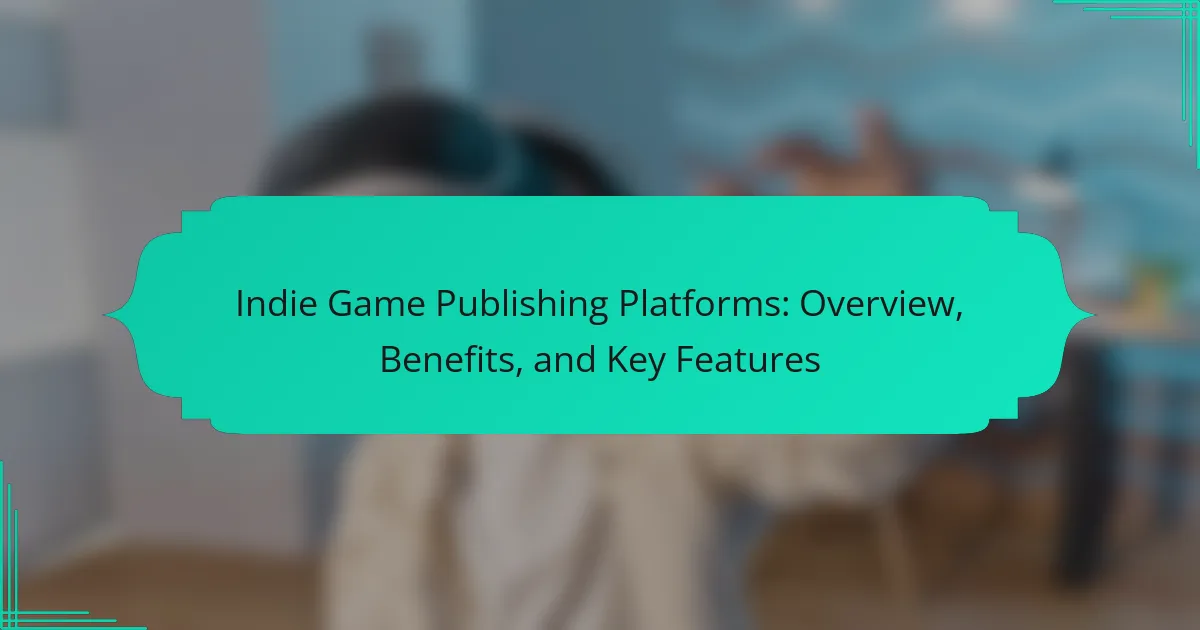Indie game publishing platforms help developers reach wider audiences and enhance visibility. This overview covers the benefits of using these platforms, key features that support developers, and the unique attributes that differentiate them. Popular options like Steam and itch.io offer tailored tools and resources for various game genres. Understanding these aspects can significantly impact an indie developer’s success in the gaming market.
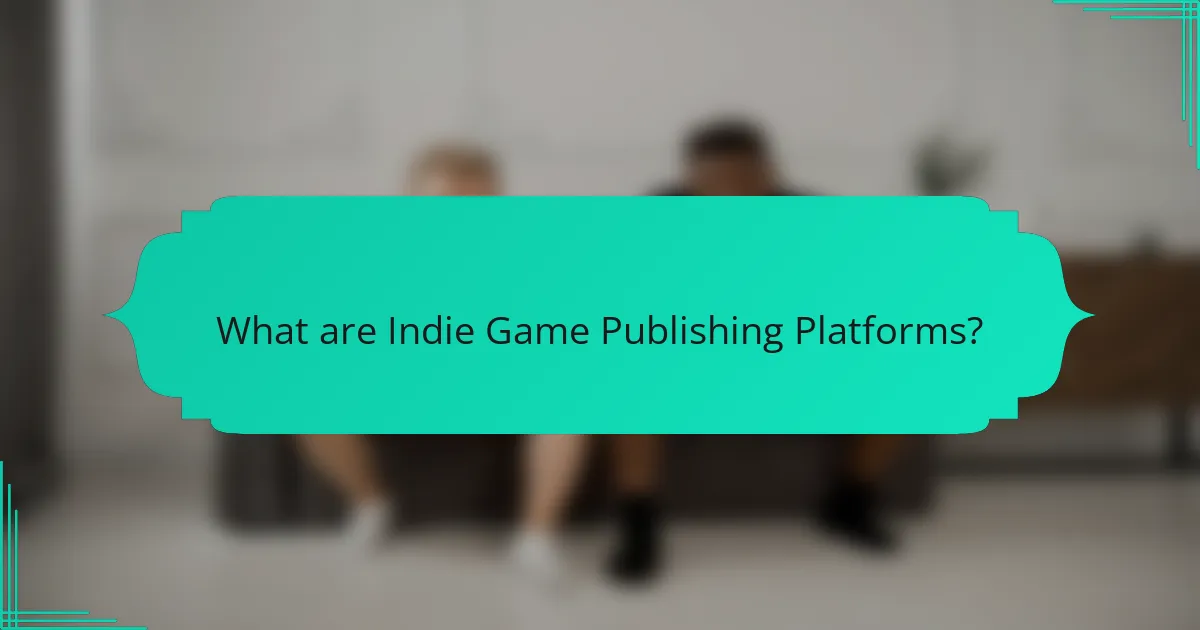
What are Indie Game Publishing Platforms?
Indie game publishing platforms provide developers with tools and services to distribute their games independently. These platforms offer benefits such as increased visibility, access to a wider audience, and often lower fees compared to traditional publishing. Key features include user-friendly interfaces, marketing support, analytics, and community engagement options. Popular platforms like Steam, itch.io, and Epic Games Store exemplify these attributes, catering to diverse indie game needs.
How do Indie Game Publishing Platforms differ from traditional publishing?
Indie game publishing platforms offer greater creative freedom and lower costs compared to traditional publishing. Unlike traditional publishers, indie platforms prioritize developer autonomy and often provide direct access to audiences. They typically feature user-friendly tools and flexible revenue models, enabling developers to retain more profits. Additionally, indie platforms foster niche markets and community engagement, which enhances visibility and support for unique game concepts.
What role do Indie Game Publishing Platforms play in the gaming ecosystem?
Indie game publishing platforms play a crucial role in the gaming ecosystem by providing developers with essential resources and exposure. These platforms enable independent creators to distribute their games, reach larger audiences, and access funding opportunities. They often offer tools for marketing, community engagement, and analytics, which enhance game visibility and player interaction.
Key benefits include lower barriers to entry, diverse revenue models, and support for creative freedom. Unique features like crowdfunding options and community feedback loops set these platforms apart, fostering innovation in game development. Overall, indie game publishing platforms are vital for nurturing creativity and diversity in the gaming industry.

What are the key benefits of using Indie Game Publishing Platforms?
Indie game publishing platforms offer significant benefits for developers. They provide access to a wider audience, enabling creators to showcase their games globally. Additionally, these platforms often feature user-friendly tools for marketing and distribution, streamlining the launch process. They also foster community engagement, allowing developers to connect with players for feedback and support. Finally, many platforms offer revenue-sharing models that can be more favorable than traditional publishing routes, enhancing profit potential for indie developers.
How do Indie Game Publishing Platforms enhance visibility for developers?
Indie game publishing platforms significantly enhance visibility for developers through various marketing strategies, community engagement, and distribution networks. These platforms often provide developers with access to a wider audience, leveraging their established user bases.
Moreover, they offer tools for promotional campaigns, social media integration, and analytics to track performance. By showcasing games in curated lists or featured sections, these platforms increase discoverability. Additionally, community features like forums and user reviews foster engagement, allowing developers to connect directly with their audience.
In summary, indie game publishing platforms serve as vital conduits for developers, amplifying their reach and facilitating meaningful interactions with potential players.
In what ways do these platforms provide financial support to indie developers?
Indie game publishing platforms provide financial support to developers through revenue sharing, grants, and crowdfunding options. These platforms typically offer a percentage of sales revenue, which can be more favorable than traditional publishing deals. Additionally, some platforms provide grants to promising projects, helping developers cover production costs without repayment obligations. Crowdfunding features allow developers to raise funds directly from potential players, ensuring financial backing before launch.
What community-building opportunities do Indie Game Publishing Platforms offer?
Indie game publishing platforms offer various community-building opportunities that enhance player engagement and developer collaboration. These platforms facilitate forums, social media groups, and events where developers can connect with players and each other. They provide tools for feedback collection, enabling developers to improve their games based on community input. Additionally, many platforms host competitions and showcases, allowing indie games to gain visibility and foster a sense of community among creators and gamers.
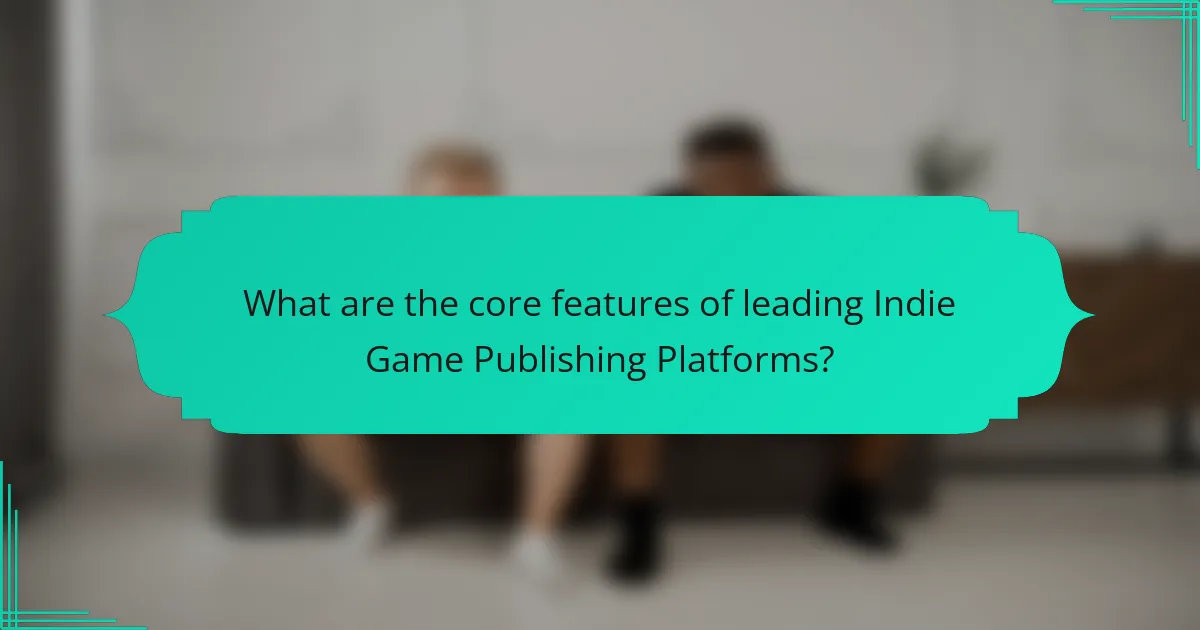
What are the core features of leading Indie Game Publishing Platforms?
Leading indie game publishing platforms offer essential features that enhance visibility and support for developers. Key features include user-friendly interfaces, robust marketing tools, and flexible revenue models. These platforms often provide analytics to track game performance, community engagement features, and support for multiple platforms, ensuring broad reach. Additionally, they may offer unique attributes like tailored publishing assistance or exclusive partnerships that differentiate them in a competitive market.
How do user-friendly interfaces impact developer experience?
User-friendly interfaces significantly enhance developer experience by streamlining workflows and reducing frustration. Intuitive designs minimize the learning curve, allowing developers to focus on creativity rather than navigation. Key features like drag-and-drop functionality and clear documentation further improve usability. These elements foster a productive environment, ultimately leading to higher quality game releases on indie publishing platforms.
Which marketing tools are commonly integrated into these platforms?
Indie game publishing platforms commonly integrate tools for analytics, marketing automation, community engagement, and payment processing. These tools enhance visibility and streamline operations.
| Tool Type | Example Tools |
|————————|——————————-|
| Analytics | Google Analytics, Unity Analytics |
| Marketing Automation | Mailchimp, Hootsuite |
| Community Engagement | Discord, Reddit |
| Payment Processing | PayPal, Stripe |
What analytics capabilities are essential for developers on these platforms?
Developers need analytics capabilities that include user engagement tracking, revenue monitoring, and performance metrics. These features help optimize game development and marketing strategies. Real-time data analysis is essential for making informed decisions and enhancing user experience. Additionally, A/B testing tools provide insights into player preferences and behaviors, enabling targeted improvements.
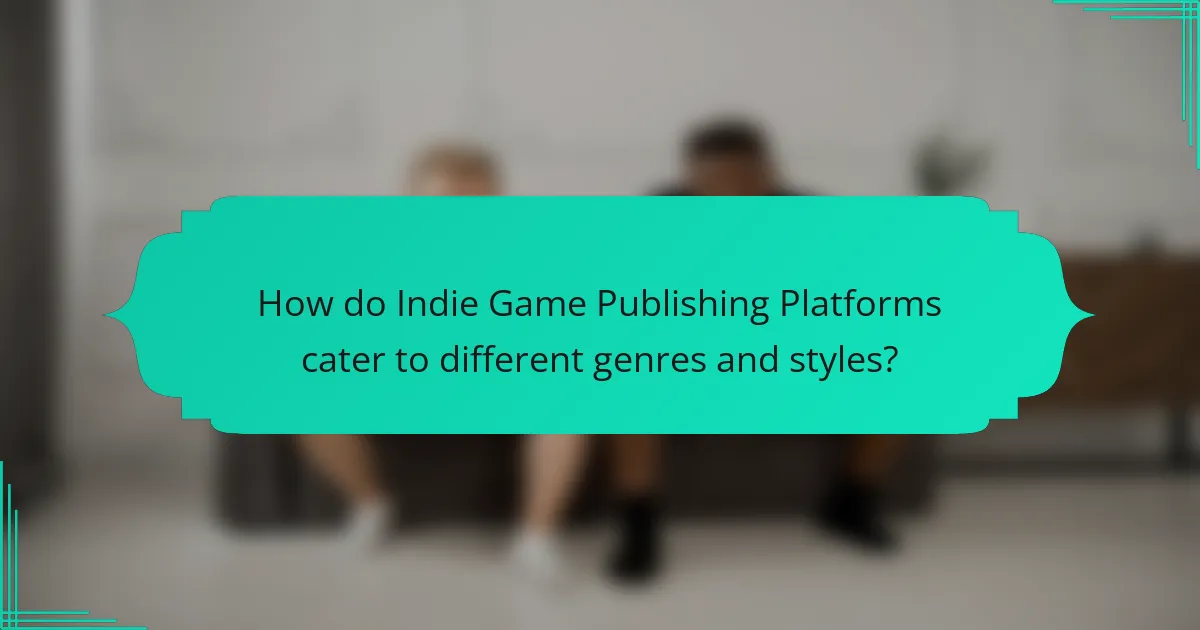
How do Indie Game Publishing Platforms cater to different genres and styles?
Indie game publishing platforms cater to different genres and styles by offering tailored tools and resources. These platforms provide genre-specific marketing strategies, community engagement features, and funding options that align with diverse game styles. For example, platforms like itch.io focus on indie and experimental games, while Steam supports a wider range of genres, including AAA titles. This specialization helps developers reach their target audience more effectively, enhancing visibility and sales potential.
Which platforms are best suited for narrative-driven games?
Platforms best suited for narrative-driven games include Steam, itch.io, and Epic Games Store. These platforms support rich storytelling and offer tools for indie developers.
Steam provides extensive community features and broad reach, making it ideal for narrative engagement. Itch.io allows for creative freedom and unique distribution methods, catering to niche audiences. Epic Games Store focuses on high-quality titles and offers favorable revenue sharing, attracting developers with compelling narratives.
These platforms enhance visibility and support for narrative-driven games, fostering a vibrant ecosystem for storytelling in gaming.
What features support multiplayer or competitive gaming experiences?
Indie game publishing platforms support multiplayer and competitive gaming experiences through features like matchmaking systems, leaderboards, and community tools. These elements enhance player interaction and engagement.
Matchmaking systems facilitate finding opponents or teammates based on skill levels, ensuring balanced gameplay. Leaderboards provide a competitive edge by displaying player rankings, fostering motivation to improve. Community tools, such as forums and chat systems, allow players to connect, strategize, and share experiences, enriching the overall gaming environment.
These features collectively contribute to a dynamic and engaging multiplayer experience, essential for indie games aiming to thrive in competitive markets.
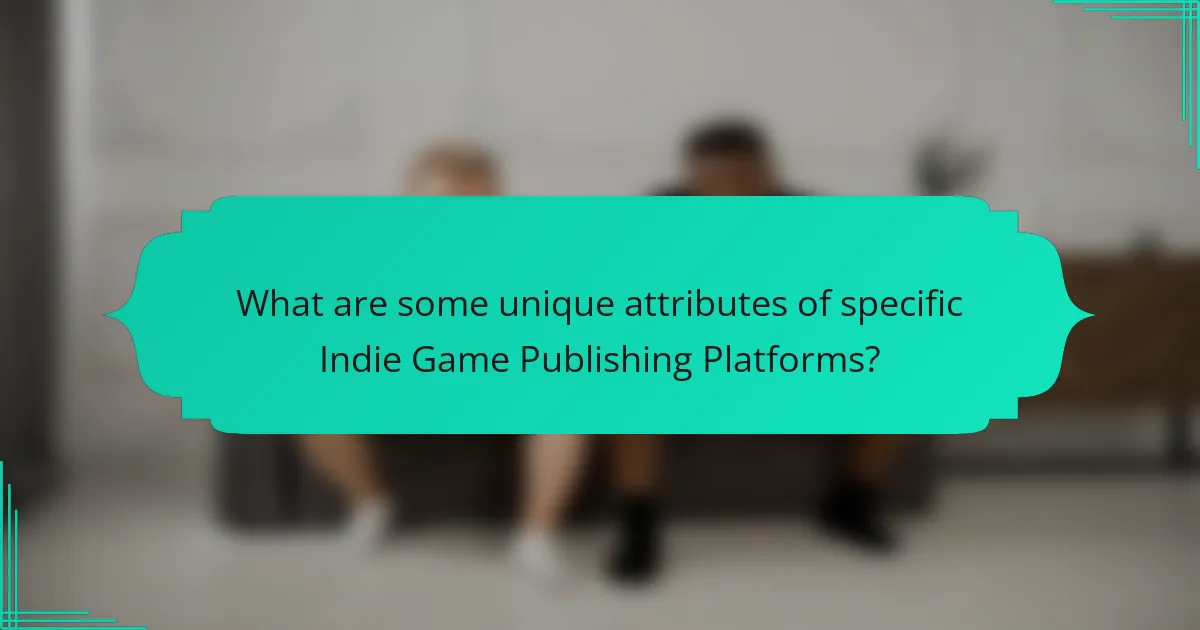
What are some unique attributes of specific Indie Game Publishing Platforms?
Indie game publishing platforms exhibit unique attributes that cater to developers’ needs. These platforms often provide flexible revenue models, allowing creators to retain more profits. Some offer specialized marketing support, enhancing visibility in a crowded market. Additionally, certain platforms emphasize community engagement, fostering direct interaction between developers and players. Others may feature unique distribution channels, such as exclusive partnerships with gaming consoles or digital storefronts.
How does platform exclusivity affect game launches?
Platform exclusivity significantly impacts game launches by limiting audience reach and influencing marketing strategies. Exclusive titles often generate heightened anticipation, yet they can alienate potential players on other platforms. This exclusivity can drive sales on the chosen platform but may also restrict overall revenue potential. Developers must weigh the benefits of exclusivity against the larger market opportunities available through multi-platform releases.
What innovative revenue-sharing models are offered by certain platforms?
Innovative revenue-sharing models offered by indie game publishing platforms include flexible profit splits, tiered revenue percentages, and community-driven funding. Platforms like Patreon allow creators to set their own revenue goals, while others, like Itch.io, provide developers with the option to choose their revenue share, often ranging from 10% to 30%. These models empower developers by aligning financial incentives with community support and engagement, fostering a collaborative ecosystem.
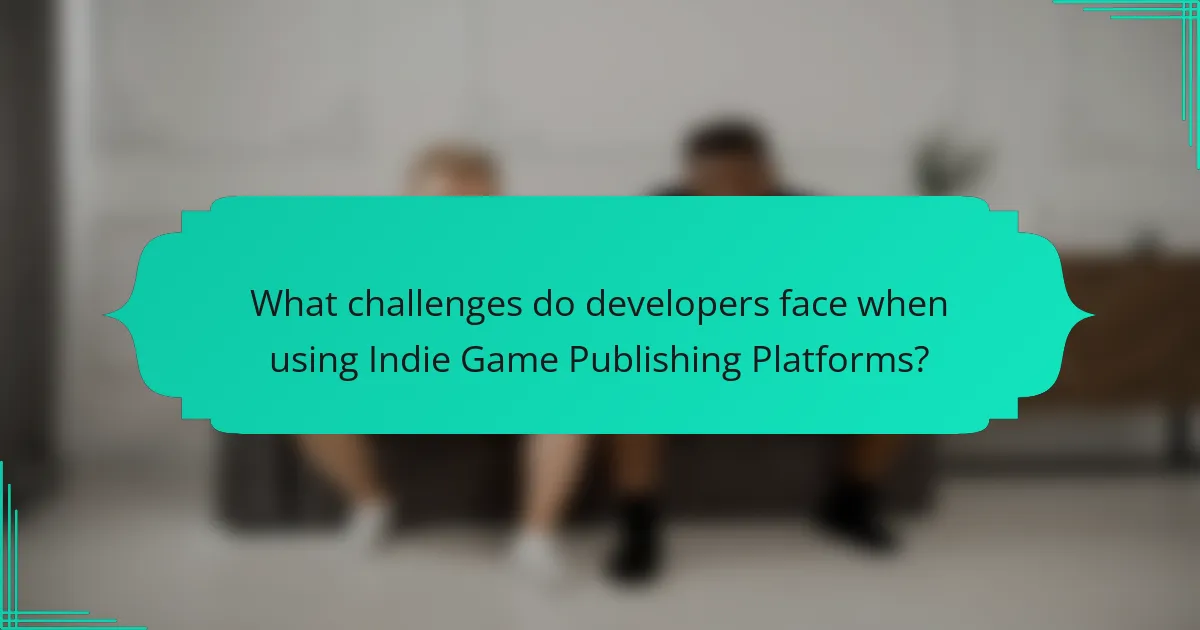
What challenges do developers face when using Indie Game Publishing Platforms?
Developers face several challenges when using Indie Game Publishing Platforms, including visibility, revenue sharing, and platform restrictions. Limited marketing resources hinder exposure, making it difficult to reach potential players. Revenue sharing models often favor platforms over developers, impacting profitability. Additionally, strict platform guidelines can limit creative freedom and game features.
How do platform policies impact game distribution?
Platform policies significantly shape game distribution by determining visibility, revenue sharing, and access to audiences. These policies can favor certain genres or developers, impacting indie game success. For instance, platforms may prioritize featured games based on their compliance with guidelines, affecting discoverability. Additionally, revenue-sharing models can influence pricing strategies and profitability for indie developers. Understanding these factors is essential for effective game publishing on various platforms.
What common pitfalls should developers avoid when choosing a platform?
Developers should avoid common pitfalls like neglecting platform fees, overlooking audience reach, and ignoring support services. Failing to assess the platform’s user interface can also hinder game success. Each platform has unique attributes that can impact visibility and revenue.
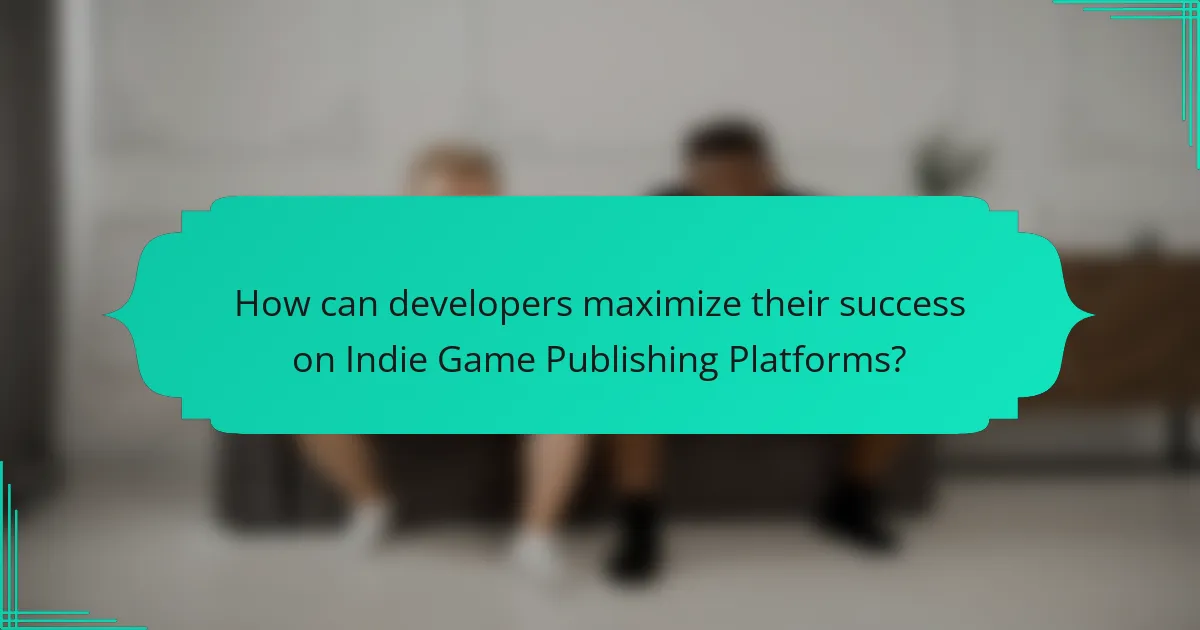
How can developers maximize their success on Indie Game Publishing Platforms?
Developers can maximize their success on indie game publishing platforms by focusing on effective marketing, community engagement, and understanding platform features. Strong marketing strategies increase visibility, while engaging with the community fosters loyalty. Familiarity with platform features, such as analytics tools, allows for better decision-making. Additionally, leveraging user feedback can drive improvements and enhance player satisfaction.
What best practices should be followed for effective marketing on these platforms?
To achieve effective marketing on indie game publishing platforms, focus on understanding your target audience and engaging with them authentically. Utilize social media channels to build a community around your game, share development updates, and gather feedback. Leverage influencers and gaming communities to amplify your reach, ensuring your marketing materials are visually appealing and highlight unique game features. Regularly analyze marketing performance metrics to refine strategies and enhance user engagement.
Which strategies enhance community engagement and feedback?
To enhance community engagement and feedback, indie game publishing platforms should implement strategies that prioritize user interaction and feedback mechanisms.
Encouraging regular updates and communication fosters a sense of community. Utilizing forums and social media allows developers to connect directly with players. Incentivizing feedback through rewards or recognition can motivate users to share their thoughts. Surveys and polls provide structured ways to gather opinions, ensuring players feel heard. Lastly, hosting events or game jams encourages collaboration and builds community spirit.
What are the common mistakes to avoid when launching a game on these platforms?
Common mistakes to avoid when launching a game on indie publishing platforms include inadequate market research, ignoring platform guidelines, poor marketing strategies, and neglecting community engagement.
1. Inadequate market research can lead to misalignment with audience expectations.
2. Ignoring platform guidelines may result in rejection or poor visibility.
3. Poor marketing strategies fail to generate sufficient interest or awareness.
4. Neglecting community engagement limits valuable feedback and support.
